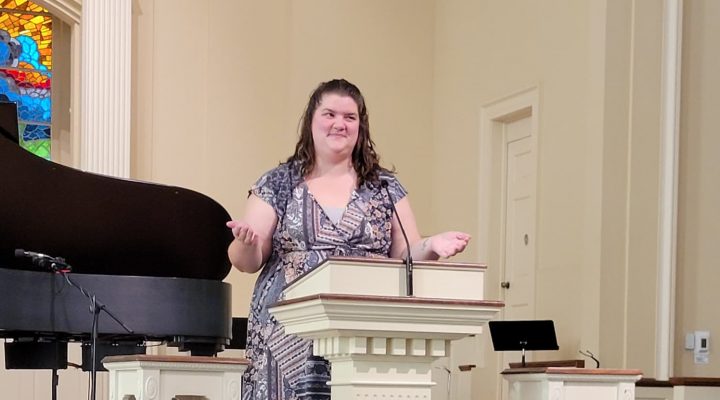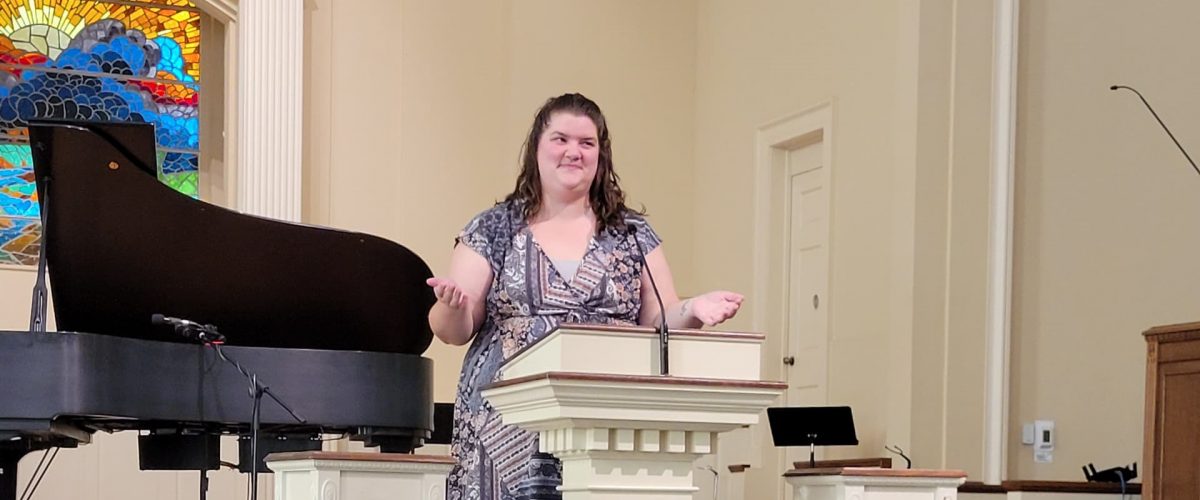I haven’t found the right adjective to describe how it feels to find my church and my picture on the list of Baptist churches circulating as evidence that the Southern Baptist Convention should change its constitution to disfellowship churches with women pastors.
I was surprised — my church made the list due to association with our state convention and the way our mission giving gets broken down, and not because we have deep ties to the SBC.
I was a little unsettled. It’s strange to have your face and work address made so available to people who think you’re usurping God’s intended order.

Carlisle Davidhizar
I was amused. “Is this what infamy feels like?” I hollered across the house at my husband. “I made Mike Law’s list of rebellious lady pastors.”
I felt stung in a way that was partially sadness, partially anger and partially resignation.
I knew going to seminary, being ordained and accepting a job with “pastor” in the title meant I no longer was subscribing to the beliefs of the denomination that raised me and taught me to love Jesus. When I applied for jobs after seminary, I vetted them carefully to make sure I wouldn’t have to fight the are-women-really-called-to-ministry battle anymore. I found one.
The church I’m currently serving made that decision back in the late 1970s and early 1980s after the fundamentalist takeover of the SBC. This congregation has been ordaining women as deacons and ministers of the gospel for decades. We’re connected to the Baptist General Association of Virginia and the Cooperative Baptist Fellowship — only nominally to the SBC. No one batted an eyelash when my title was announced as “associate pastor for families and community” and no one gets stressed on the Sundays I’m in the pulpit.
So I knew some of the folks who still love me (and I still love them) from my years in the SBC would disapprove of my calling, church and title. What I hadn’t realized, was that there was a pretty large contingent of Southern Baptist pastors, professors and churches that consider me an active threat.
“What I hadn’t realized, was that there was a pretty large contingent of Southern Baptist pastors, professors and churches that consider me an active threat.”
One of the many phrases Pastor Mike Law of Arlington Baptist Church in Arlington, Va., used in his letter was that “abiding women in the pastoral office materially harms the work of the convention” because it “contaminates the soil with distrust and disobedience to Scripture.”
Who knew that of all the problems in the world and the church, women proclaiming the gospel and holding a certain title was the most pressing? Racism. Economic injustice. A secret list of more than 700 sexual predators. These might all be unfortunate, but the real problem, the thing keeping Southern Baptists from unity, the thing causing them to “devalue their doctrine,” is women pastors.
In his letter, Law appeals to an interpretation of several traditional clobber passages that are commonly cited when arguing against women in ministry. He’s particularly attached to 1 Timothy 3. And this isn’t anything new for women serving in environments with different understandings of how to interpret those passages. We’ve heard those phrases, in English, pulled fully out of their historical, cultural and linguistic contexts to tell us to sit down and be quiet. We’ve done our own work on them. We know people from all walks of life can and do come to different conclusions on a whole host of scriptural interpretation. We’ve made our peace with the fact that we can exegete well, translate from Greek and reference world-class scholars and there will still be people who bring them up like we don’t know they’re in the Scriptures.
“We’ve heard those phrases, in English, pulled fully out of their historical, cultural and linguistic contexts to tell us to sit down and be quiet.”
Law, however, seems unaware that opinions other than his own exist.
He says Paul “does not leave us guessing as to how the household of God should be ordered.” Never mind that Paul cites women doing gospel work all over the rest of his New Testament letters. I suppose Lydia, Junia, Priscilla, Chloe and the rest of the women mentioned in Romans 16 aren’t enough evidence. I guess the Old Testament story of Deborah the judge and military leader of Israel isn’t enough. It seems the prophetess Huldah — the only person capable of interpreting the law in 2 Kings — wasn’t actually speaking God’s words. Perhaps instead of preaching the gospel after she was the first one to witness the resurrected Christ, Mary Magdalene went to find an appropriate man to do it for her.
If you can honestly read the entirety of the scriptural witness, take into account that there are myriad nuanced cultural and sociological factors at play, and look at the open, honest, equitable encounters that Jesus has with women, and still come to the conclusion that this is crystal clear with no room for other interpretations, then I guess peace be with you.
There are plenty of churches that have differing views on things like that. Historically, Baptists have been so committed to the idea of church autonomy that they’ve left wiggle room for churches to set their own belief statements, hire their own staff and lovingly disagree. Baptist churches don’t all agree on atonement theories, open vs. closed communion, selection of deacons and elders or how closely the church and the national government should be tied.
Baptist churches like mine have been willing to work with churches that have differing opinions than ours. We’ve partnered with churches of different denominations and religious organizations of totally different faiths in our community. A portion of our giving has continued to go to efforts that are championed by the SBC because it was good gospel work.
But apparently Mike Law and the other 2,149 men who have signed his letter and contributed to his list have decided it’s time to draw a line in the sand. And that line is women in pulpits and women at churches who have “pastor” in their title. That really says it all to me.
They have no problem with women doing vital work in the church. I’m sure it’s fair to say, because it’s been true in every church I’ve ever attended, that they’d be decidedly up a creek without a paddle if all the women serving in their churches decided to stop. Women can even do essential pastoral work as long as it’s to children, youth, other women or we’re willing to call them foreign missionaries or directors.
The irony isn’t lost on me that some of my church’s SBC giving over the years has gone to the Lottie Moon Offering. Lottie Moon is arguably the SBC’s largest and most historic mission fund named for its well-known missionary, but would they consider her a proclaimer of the gospel? A preacher? Probably not. And that’s to say nothing of the fact that the SBC would have gone under financially twice over the course of its lifespan if it hadn’t been for the generosity of the Women’s Missionary Union.
“Law is going to have to forgive me if I don’t buy his line that this is about scriptural integrity, doctrinal purity or unity within the denomination.”
So Law is going to have to forgive me if I don’t buy his line that this is about scriptural integrity, doctrinal purity or unity within the denomination. This is about what it’s always been about: power.
In Beth Allison Barr’s book The Making of Biblical Womanhood, she makes a compelling case for how the evangelical concept of biblical womanhood has come much more from our own patriarchal culture and history than it does from Scripture itself. It’s also more about power than anything else, whether that’s the intention behind it or otherwise.
I’ve heard all the best arguments for complementarianism and male headship. I believe, with my whole heart, that most of the people who have made them to me have the best of intentions. I’ve heard that men and women thrive in that type of environment, that women are protected in these systems, that the success of the church reclaiming the culture depends on everyone knowing their assigned role and performing it.
But I have to be honest with you.
I spent more time anxious and guilty than I ever did thriving. I worried I wasn’t quiet enough in spirit. I obsessed over my tone, sat on my hands and didn’t speak up when I should have and wanted to. I listened to people say women were too emotional to lead while they watched apoplectically angry men scream at each other on television as if anger wasn’t an emotion. I heard women struggled with biblical interpretation and needed to be led by strong men as if the same Holy Spirit doesn’t reside in all of us.
When I finally decided to stop squashing myself into a complementarian box, my marriage and my calling felt set free.
I have a hard time believing the point of the system is to protect women when keeping track of abusers for reputation purposes is more important than ejecting those men from ministry. It doesn’t feel very safe when a Waco megachurch pastor speaks about women in a sermon as if the vast majority of us are temptresses who hate him and want to destroy his life. I felt downright afraid at 14 years old when I was told my body may cause my brothers in Christ to think lustful thoughts and that their continued good sexual behavior was my responsibility.
Having my photo and work address passed around the internet doesn’t feel like something these pastors have done to keep me safe.
“Having my photo and work address passed around the internet doesn’t feel like something these pastors have done to keep me safe.”
I’ve stopped believing that reclaiming the culture is the way for the church to move forward. Christ calls us out into an alternate society and kingdom where there is no hierarchy. Rather than a rigid system where everyone has to know their place in order to thrive, Jesus offers us freedom. Freedom to be a priesthood of believers where everyone can minister in whatever capacity and gifting they have. The Cross of Christ has broken the curse of sin and death forever. We who are in Christ can let the patriarchy go and live into the beautiful equality of the redeemed.
Even as I say all of this and continue to process the emotional impact of the last few days, I’m conscious of the fact that not everybody in the SBC or everyone who believes in male headship thinks kicking out all of these churches is the right thing to do. I know that. There are a lot of people I love who support me and my calling even if they don’t understand it or they go to churches who would never hire me.
My church is taking steps to finalize breaking all ties with the SBC ahead of the vote on this amendment in June, but if your church isn’t, please consider the fact that your voice and your vote matter. You can vote against this. You can say out loud that the women in your congregations are vital leaders. You can say that even if you’re not sure women should be pastors, this isn’t the right way to do things.
May the next generation of Baptist women who God has called to ministry not have to find their names on a list that calls them disobedient contaminants.
Carlisle Davidhizar is a graduate of George W. Truett Theological Seminary and serves as associate pastor for families and community at May Memorial Baptist Church in Powhatan, Va.
Related articles:
How dare they publish that list | Opinion by Arthur Wright Jr.
‘Let the messengers decide,’ two SBC leaders say of debate about expelling churches with female pastors
Denny Burk pushes back against Rick Warren’s new understanding of women in ministry
Scripture changed his mind on women in ministry, Rick Warren tells Russell Moore
Southern Baptist Convention ousts its largest church, Saddleback, for having a woman pastor


